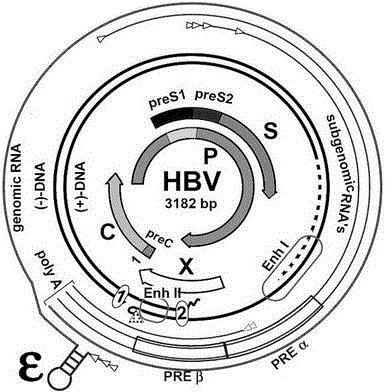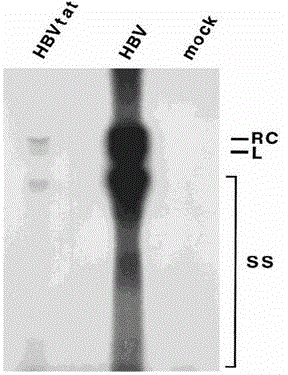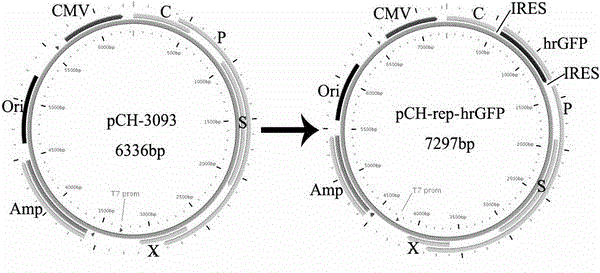Replicative HBV (Hepatitis B Virus) vector carrying foreign gene and recombinant HBV generated after transfection and corresponding preparation method and application
An exogenous gene and replication technology, applied in the field of biomedical engineering, can solve the problems of non-replicating HBV vector application, low replication level, loss of infectivity, etc.
- Summary
- Abstract
- Description
- Claims
- Application Information
AI Technical Summary
Problems solved by technology
Method used
Image
Examples
Embodiment 1
[0099] Example 1 Replication-type HBV vector carrying foreign genes and its preparation method
[0100] Two replicating HBV vectors, pCH-BsdR and pCH-hrGFP, were constructed to insert foreign genes. Both vectors use cytomegalovirus (CMV) promoter to initiate transcription, contain the whole HBV genome, and express blasticidin respectively. Resistance gene (BsdR) and humanized Renilla green fluorescent protein (hrGFP) gene.
[0101] Such as image 3 As shown, the left side of the figure is the wild-type HBV vector pCH-9 / 3093, with CMV promoter, prokaryotic replication initiation site (Ori), prokaryotic screening marker ampicillin resistance gene (Amp), containing 1.05 times the HBV genome, The full length is 6336 bp. After the vector transfects cells, it can transcribe the same genomic RNA and various subgenomic RNAs as wild-type HBV, and express various HBV proteins, complete the full cycle of HBV replication, and package complete, infectious cells. Wild-type HBV virions....
Embodiment 2
[0124] Example 2 The inspection of the HBV vector carrying foreign gene
[0125] 1. Two tandem Rbm3 IRES on HBV pregenomic RNA can effectively initiate protein translation
[0126] At present, no studies have reported the translation initiation efficiency of Rbm3 IRES in human hepatocytes. In order to test the ability of Rbm3 IRES to guide translation initiation on the RNA strand similar to HBV pregenomic RNA (HBV pgRNA), and to prove whether Rbm3 IRES is applicable For the construction of bicistronic and tricistronic vectors, two series of 8 types of plasmids were constructed using Rbm3 IRES, which were transfected into HepG2 and Huh7 cells derived from liver cancer cells, and the exogenous fluorescent groups guided by Rbm3 IRES were detected. The expression level of the cluster was used to verify the feasibility of using Rbm3 IRES to construct a replicative HBV vector and use it in hepatocytes. At the same time, it was compared with the HBV vector using EMCV IRES to compar...
Embodiment 3
[0246] Example 3 Recombinant HBV and its preparation method after a replicative HBV vector carrying an exogenous gene is transfected into a cell
[0247] A recombinant HBV carrying an exogenous gene, the recombinant HBV is the recombinant HBV collected in the cell culture supernatant after the HBV vector described in Example 2 is transfected into liver cancer cells, the recombinant HBV not only retains the ability to replicate and infect Can express foreign genes.
[0248] This embodiment also provides a method for preparing the above-mentioned recombinant HBV carrying the foreign gene, which is carried out according to the following sequence of steps:
[0249] (21) Construction of HBV vectors carrying foreign genes;
[0250] (22) Use the vector prepared in step (21) to transfect the cell line derived from liver cancer, and add 1%-2% dimethyl sulfoxide to the cell culture medium, which can significantly improve the replication level of recombinant HBV and the final Yield; ...
PUM
 Login to View More
Login to View More Abstract
Description
Claims
Application Information
 Login to View More
Login to View More - R&D
- Intellectual Property
- Life Sciences
- Materials
- Tech Scout
- Unparalleled Data Quality
- Higher Quality Content
- 60% Fewer Hallucinations
Browse by: Latest US Patents, China's latest patents, Technical Efficacy Thesaurus, Application Domain, Technology Topic, Popular Technical Reports.
© 2025 PatSnap. All rights reserved.Legal|Privacy policy|Modern Slavery Act Transparency Statement|Sitemap|About US| Contact US: help@patsnap.com



